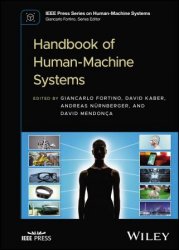Handbook of Human-Machine Systems
- Добавил: literator
- Дата: 14-07-2023, 02:42
- Комментариев: 0
 Название: Handbook of Human-Machine Systems
Название: Handbook of Human-Machine SystemsАвтор: Giancarlo Fortino, David Kaber, Andreas Nurnberger
Издательство: Wiley-IEEE Press
Год: 2023
Страниц: 528
Язык: английский
Формат: epub (true)
Размер: 28.7 MB
Insightful and cutting-edge discussions of recent developments in human-machine systems.
In Handbook of Human-Machine Systems, a team of distinguished researchers delivers a comprehensive exploration of human-machine systems (HMS) research and development from a variety of illuminating perspectives. The book offers a big picture look at state-of-the-art research and technology in the area of HMS. Contributing authors cover Brain-Machine Interfaces and Systems, including assistive technologies like devices used to improve locomotion. They also discuss advances in the scientific and engineering foundations of Collaborative Intelligent Systems and Applications.
Companion technology, which combines trans-disciplinary research in fields like computer science, AI, and cognitive science, is explored alongside the applications of human cognition in intelligent and artificially intelligent system designs, human factors engineering, and various aspects of interactive and wearable computers and systems. The book also includes:
A thorough introduction to human-machine systems via the use of emblematic use cases, as well as discussions of potential future research challenges Comprehensive explorations of hybrid technologies, which focus on transversal aspects of human-machine systems Practical discussions of human-machine cooperation principles and methods for the design and evaluation of a brain-computer interface
Human-Machine Systems (HMS) refer to integrated systems where the functions of human operators and machines are combined. These systems can be seen as a unified entity that interacts with the external environment. In an HMS, humans and machines work together, leveraging their respective capabilities to achieve specific goals or perform tasks.
HMS can take various forms and exist in different domains. Examples include aircraft flight control systems, industrial automation systems, medical robotic systems, and even virtual assistants or chatbots. In these systems, humans contribute their cognitive abilities, decision-making skills, and expertise, while machines provide computational power, automation, and precision.
The integration of humans and machines in HMS can be achieved through different levels of automation. It can range from fully manual systems, where humans are responsible for all tasks, to partially automated systems, where machines assist humans in specific functions, to fully autonomous systems, where machines take over the majority of tasks with minimal human intervention.
Perfect for academic and technical researchers with an interest in HMS, Handbook of Human-Machine Systemswill also earn a place in the libraries of technical professionals practicing in areas including computer science, artificial intelligence, cognitive science, engineering, psychology, and neurobiology.
Скачать Handbook of Human-Machine Systems
[related-news] [/related-news]
Внимание
Уважаемый посетитель, Вы зашли на сайт как незарегистрированный пользователь.
Мы рекомендуем Вам зарегистрироваться либо войти на сайт под своим именем.
Уважаемый посетитель, Вы зашли на сайт как незарегистрированный пользователь.
Мы рекомендуем Вам зарегистрироваться либо войти на сайт под своим именем.
